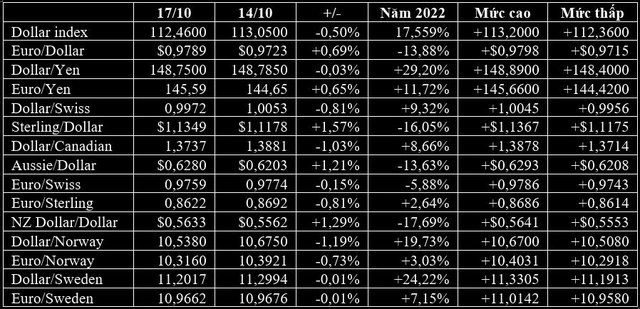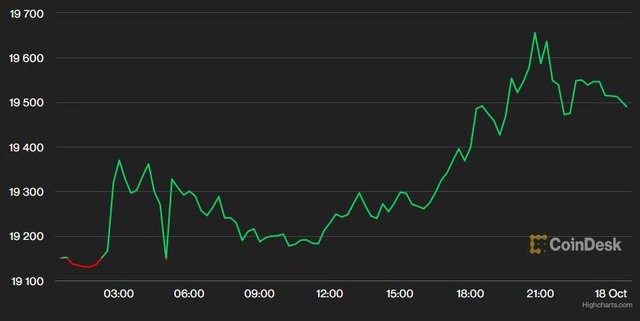Jeremy Hunt, who was appointed finance minister by Prime Minister Liz Truss on Friday (October 14), on Monday (October 17) vowed to reverse most of the tax measures outlined in the plan. The small budget plan announced by predecessor Kwasi Kwarteng on September 23, which reversed plans to reduce dividend tax, keep alcohol tax unchanged, while exempting VAT for foreign visitors. Mr. Hunt affirmed that the most important goal of the government right now is to keep stability, saying that while the government cannot eliminate market fluctuations, it can play a role in stabilizing.
Government bonds and the pound rebounded after Secretary Jeremy Hunt’s statement, while pushing US Treasury yields lower.
Chris Beauchamp, IG’s head of market analysis, said: “For now, the market seems happy with the new Prime Minister’s view.”
The British pound at the end of October 17 in Vietnam time increased by 1.57% to 1.1349 USD. The euro also gained 0.69% against the greenback.
Meanwhile, the Dollar index – which compares the USD against a basket of major partner currencies – fell 0.5% to 112.46.
Investor sentiment toward risk assets also improved after Bank of America reported a less-than-expected quarterly profit and said spending by its American clients remained strong, despite albeit slowing down.
Traders are also watching for any intervention from the Bank of Japan (BoJ) after the yen fell to a 32-year low.
The Japanese currency in the session of October 17 sometimes fell to 148.84 JPY/USD, before ending the session at 148.75 JPY.
Last month, Japan intervened by buying the yen for the first time since 1998, after the BoJ stuck with its policy of keeping interest rates extremely low, which has negatively affected the currency this year.
BoJ Governor Haruhiko Kuroda on October 17 reaffirmed his commitment to maintain super-low interest rates to support the economy, although the yen continued to depreciate rapidly, after having fallen sharply in the past week, amid the backdrop of the crisis global financial leaders acknowledge the extreme volatility of money markets.
Speaking to reporters in Washington at the end of last week, Japan’s Deputy Finance Minister Masato Kanda stated that the Japanese government and the BoJ would not hesitate to intervene in the market again if fluctuations in the market were excessive. Foreign exchange continues. “We are always ready to take decisive action” he stressed.
China’s yuan fell again in the past session, but the decline was limited as the country’s large state-owned banks intervened in the market to stabilize the local currency.
Accordingly, the State Banks of China exchanged yuan for dollars in the futures market and sold those dollars in the spot market.
On the domestic market, the Chinese yuan on October 17 traded in a narrow range (2%), ending the session at 7.1985 CNY/USD, down 60 pips from the previous session.
China will release third-quarter gross domestic product data on Tuesday, and a Reuters poll shows the economy is likely to weather growing challenges in and around the world foreign.
Sheng Songcheng, a former official at the People’s Bank of China, said the bank still has many policy tools to influence the yuan, and the currency is less likely to depreciate sharply in the long run.
In the cryptocurrency market, Bitcoin surged to around $19,500 after France’s third-largest bank by market value, Société Générale, was approved by the regulator to operate as a service provider of digital currency in the country, and India revealed plans to develop a standard operating procedure (SOP) for digital currency during the G20 presidency, from December 1, 2022 to November 30, 2023.
Gold prices rose more than 1% in the past session, in contrast to the previous session’s downtrend, as the USD and US Treasury yields fell, although there is still the possibility that the Fed will raise interest rates sharply.
At the end of October 17, Vietnam time, spot gold price increased 1.2% to USD 1,661.33 per ounce, leaving the lowest level in more than 2 weeks touched in the previous session; December gold futures rose 1.1% to $1,667.60.
Still, it will be “a struggle for gold to continue to rise despite so many doubts in the world. Investors want to be safe, but it’s hard not to get into Treasury purchases when interest rates rise to grow as fast as it is now,” said Bob Haberkorn, senior market strategist at RJO Futures.
Reference: Refinitiv
Source: Vietnam Insider


